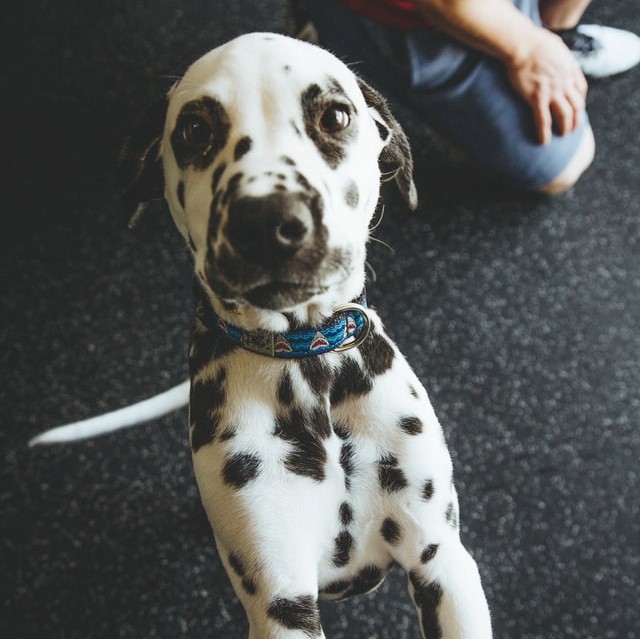The Dalmatian is one of the most easily recognized dogs in the world, thanks to its spotted coat. These loyal dogs thrive on human companionship and make great family pets, but they aren’t suited for all households. Read on to learn more about this beautiful breed.
History of the Dalmatian

While many purebred dogs have a storied history, the Dalmatian’s ancestry is largely a mystery. Although it was named after Dalmatia, a region in modern-day Croatia, there’s a good chance that the Dalmatian did not come from there.
Dalmatians have been used for a wide range of tasks over the years, from herding to retrieving. The breed was particularly popular in England as a coaching dog, clearing paths before horses, running beside the coach, and even guarding the horses and coach when not in use. Indeed, Dalmatians have a particular fondness for horses. In the United States, the Dalmatian was primarily utilized as a firefighter’s dog. Today, Dalmatians are mostly found in homes as family pets and companions.
Dalmatian Characteristics
Appearance and Coat
Dalmatians are medium-sized dogs that typically stand around 22 to 24 inches tall at the withers and weigh about 40 to 60 pounds. These pups have a sleek, athletic frame with a long tail that curves upwards. The Dalmatian’s infamous spotted coat is short and dense and features black or brown spots on white fur.
Temperament
Active, lively, and loving, Dalmatians thrive on companionship. People, especially family members, make this breed happiest. Involvement in family activities is very important to Dalmatians, who do not tolerate being left alone for long periods of time. They may become destructive or develop separation anxiety if they aren’t exposed to a lot of human interaction. Quiet and cautious, a Dalmatian is typically reserved around strangers. These dogs usually get along with other dogs and pets, but it’s preferable that they are raised with them. Like all dogs, Dalmatians should be socialized during puppyhood to prevent unwanted or troublesome behaviors.
Health
The Dalmatian is generally a healthy dog, but like all breeds, it’s prone to certain health conditions. Hereditary deafness and urolithiasis are two of the most common:
- Deafness: Hereditary deafness is a trait that all Dalmatian bloodlines are capable of passing along to their offspring. Approximately 8 percent of all Dalmatians are born completely deaf, and about 22 to 24 percent are born with hearing in only one ear. All Dalmatians should receive a BAER (Brainstem Auditory Evoked Response) test to make sure they can hear. It’s important to note that reputable breeders will only breed Dalmatians with hearing in both ears.
- Urolithiasis: Dalmatians have a unique urinary tract system, as their urine contains uric acid instead of urea or allantoin. This makes them susceptible to the formation of urinary tract stones, or Urolithiasis. These stones can cause blockages in the urinary tract, so be sure to keep an eye out for your Dalmatian's regular urination, and make sure they have plenty of fresh water available at all times.
Caring for a Dalmatian
A Dalmatian’s Ideal Home

Due to their people-oriented nature, Dalmatians are best suited for households in which someone is home for the majority of the day. Generally speaking, the maximum amount of time that a Dalmatian should be left alone is four hours.
In addition, it’s important to note that these dogs should live in an active household. This breed requires a ton of daily exercise, so it’s essential that anyone considering a Dalmatian is certain they can keep up with its high activity requirements. While Dalmatians are capable of living in an apartment if their exercise needs are met, it is recommended that they live in a home with a yard for them to run around in safely.
Training a Dalmatian
While intelligent and quick to learn, Dalmatians can also be stubborn and need continuous training. These pups tend to be quite sensitive, so they will usually respond best to positive reinforcement and reward-based training. Additionally, in order to ensure that your Dalmatian gets the right training, everyone in your family should be on board and involved. Your dog will likely develop a stronger bond with family members as a result.
Exercise
Dalmatians are high-energy dogs who love to exercise. Bred to run for miles, these dogs require daily rigorous activity in order for them to be well-behaved at home. At a minimum, a Dalmatian’s exercise needs can be met by walking or jogging for an hour every day. In addition, be sure to provide your Dalmatian with plenty of time to run freely in a secure area.
Grooming and Hygiene
One benefit of the Dalmatian’s short, fine fur is that it’s easy to maintain. Simply remove dead hair from the coat by brushing it a few times per week with a bristle brush, hound mitt, or pumice stone. However, many Dalmatian owners report that this breed’s coat sheds around the clock. That said if you choose to add a Dalmatian to your family, be prepared to deal with lots of dog fur.
The rest of Dalmatian maintenance is relatively simple. Every few weeks, or as needed, trim your Dalmatian’s nails. To prevent bacterial or yeast infections from developing, keep your dog’s ears clean and dry. Additionally, routine teeth brushing is essential for optimum oral health and breath freshness.
Have you decided on a Dalmatian for your next companion? Find your new furry friend on Lancaster Puppies today!
